There are 72 Castles on the list of UNESCO World Heritage Sites, some dating back as far as the 9th century, and surprisingly several of these incredible historic buildings are still being used as homes.
Castles come in all different shapes and sizes. With imposing crenelated walls, soaring towers, and dramatic arched entrance ways, no two palaces are the same.
But the one thing they all have in common is that they make incredible places to visit. Here is our list for the most spectacular castles in the world:
1. Neuschwanstein Castle, Germany
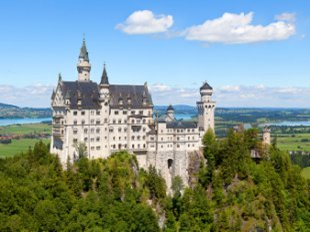
The iconic Neuschwanstein Castle
Despite being one of the newest castles on the list, Neuschwanstein Castle in Germany is easily one of the most visually dramatic. This Bavarian beauty is perched on top of a rocky hill overlooking the village of Hohenschwangau and was commissioned in 1869 by King Ludwig the second of Bavaria, using his personal fortune. A true fairy-tale castle, the property is said to have been the inspiration for Disneyland’s Sleeping Beauty Castle. The castle has been open to the public since 1886 and receives over a million visitors a year.
2. Corfe Castle, England
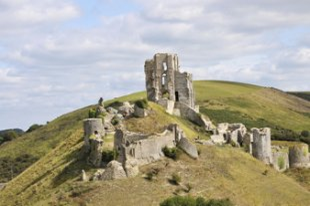
The ruins of Corfe Castle
While the original buildings would have been constructed of wood, the 11th century stone fortress was constructed on the natural hilltop by William the Conquerer and for the next 600 years was used as royal fortress by the British Monarchy. While now in ruin, this captivating site has 1,000 years worth of stories to tell.
3. Malbork Castle, Poland
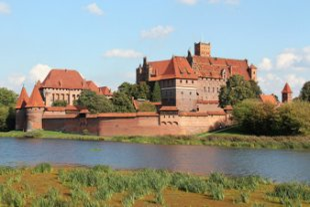
Malbork Castle
The Castle of the Teutonic Order in Malbork is the world’s largest castle by surface area and was built in the 13th century on the banks of the river Nogat by the Teutonic Knights — an order of German Roman Catholic crusaders. It is a classic example of a Medieval fortress and has been listed as a UNESCO World Heritage site since 1997. Used by the knights as a fortified monastery, it has been expanded and restored over the centuries and is now one of Poland’s historic national monuments.
4. Mont Saint-Michel, France

The striking Mont Saint-Michel
Perched high on a small island commune and surrounded by sits the breathtaking Gothic style Benedictine abbey of Saint Michel, whose monastery has occupied the position since the 8th century. The island is situated just 600 meters from the Normandy mainland and linked by a tidal causeway across the sandbanks. At high tide, the water rises up to 14 feet, flooding the surrounding area and completely cutting the island off. Just 50 people live on the island, including the monks, but over 3 million visit the site each year.
5. Hohensalzburg Castle, Austria

Hohensalzburg Castle and the surrounding city
Looming high over the city of Salzburg, this spectacular fortress is one of the largest fortifications in Europe. Construction on the original building began in 1077 but was expanded upon over the next few centuries. In the 16th century, a primitive funicular railway was constructed, providing freight access to the property, and it is still in existence today, making it the oldest operational railroad in the world. In the early 20th century the castle was actually used as a prison, housing Italian POWs during World War I.
6. Kilkenny Castle, Ireland

Kilkenny Castle
This incredible architectural masterpiece was built in 1195 by the first Earl of Pembroke as a stronghold to protect the local town. In 1391, the castle was bought by a prominent local family — the Butlers, who ruled the surrounding area and lived in the home until 1935. That’s over 500 years that the house belonged to one family. During the rest of the last century, the castle was completely restored and opened to the public.
7. Alcazar of Segovia, Spain
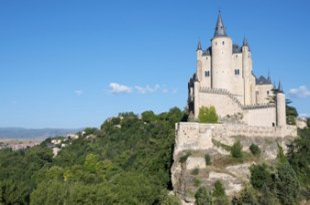
The Alcazar of Segovia is straight out of a fairy tale
This magical Spanish castle is truly a thing of fairy tales, acting as the inspiration for Disney’s Cinderella castle. Constructed mostly in the 12th century, the structure was home to the monarchs of the Kingdom of Castile and also housed the parliament. After the royal court moved to Madrid at the end of the 16th century, the castle acted as a prison for almost 200 years before being converted into the Royal Artillery School in 1762. Today the property is a heritage site and museum.
8. Prague Castle, Czech Republic
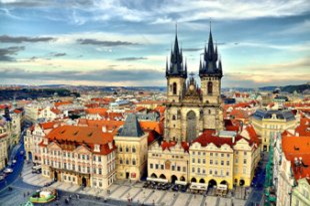
The supremely impressive Prague Castle
Prague Castle is arguably the most significant monument in the Czech Republic and according to the Guinness Book of World Records, is the largest castle complex on Earth — at over 70,000m2. The huge collection of palaces and ecclesiastical buildings began their construction back around the 9th century with additions made over the next 500 years. It has been the home of kings, Roman emperors, and most recently the presidents of the Czech Republic. The Bohemian Crown Jewels are also stored within the walls.
9. Caernarfon Castle, Wales
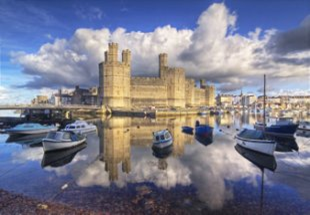
The ultra dreamy Caernarfon Castle
This monstrous stone fortress has been incredibly well preserved and is an excellent example of military architecture erected during the colonization throughout the reign of King Edward I. The first fort on the site was built by the Romans but the main stone structure, most of which is still standing, was constructed at the beginning of the 13th century. It has been a UNESCO World Heritage Site since 1986 and now houses the Royal Welch Fusiliers Museum.
10. Kronborg Castle, Denmark

You can even have a fairy-tale wedding at Kronborg Castle
One of the most iconic Renaissance castles in the world, Kronborg Castle was built as a fortress in the early 15th century by King Eric VII to control the entrance to the Baltic Sea. Between 1574 and 1585, Kind Frederic II had the construction dramatically changed into the magnificent palace that stands today. It was used as a Royal residence until 1785 when it became barracks for the army before being opened to the public in the 1920’s. The castle now hosts a very popular renaissance festival, Christmas markets, even weddings.
